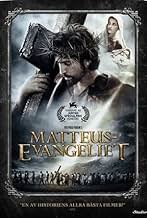The life of Jesus Christ according to the Gospel of Matthew. Film shows Christ as a Marxist avant-la-lettre and therefore uses half of the text of Matthew.The life of Jesus Christ according to the Gospel of Matthew. Film shows Christ as a Marxist avant-la-lettre and therefore uses half of the text of Matthew.The life of Jesus Christ according to the Gospel of Matthew. Film shows Christ as a Marxist avant-la-lettre and therefore uses half of the text of Matthew.
- Nominated for 3 Oscars
- 7 wins & 9 nominations total
- Caifa
- (as Rodolfo Wilcock)
- Director
- Writer
- All cast & crew
- Production, box office & more at IMDbPro
Storyline
Did you know
- TriviaIn keeping with his idea of Jesus Christ as the greatest revolutionary of all time, Pier Paolo Pasolini considered casting Jack Kerouac or Allen Ginsberg in the role. He changed his mind when he met Enrique Irazoqui, a Spanish student of literature, who has written a thesis about Pasolini's novel "Ragazzi di vita" and was very curious to meet him.
- GoofsWhen they are taking Christ down from the cross, in the distance you can see a car driving around a corner.
- Quotes
[last lines]
Christ: All authority has been given to me in heaven and earth. Go, therefore. And make disciples of all nations, baptizing them in the name of the Father, and of the Son and the Holy Ghost, teaching them to observe everything I have commanded you. And behold. I am with you always even unto the end of the world.
- Alternate versionsThe 2007 DVD release features a colorized, English-dubbed version with a run time of 91 minutes and an Italian-language black and white version running 136 minutes.
- ConnectionsEdited into Histoire(s) du cinéma: Une histoire seule (1989)
- SoundtracksMatthäus Passion (BWV 244)
Written by Johann Sebastian Bach
nr 78: Wir setzen uns mit Tränen nieder
nr 47: Erbarme Dich (musical intro)
Enrique Irazoqui, who plays Jesus, gives an excellent performance. He brings an intensity and harshness to the role that is very much in accord with the Jesus portrayed in numerous passages of the gospels. Margherita Caruso, who plays Mary as a young women, is an inspired choice. Although she does very little, and I cannot truly commend her for her acting, she has an amazing presence in this film, combining serenity, holiness, and innocence.
Pasolini paces the film well. It never drags, and never passes over subjects or incidents too quickly. The heroic quality of Jesus' life is strongly emphasized, his confrontations with existing religious authorities, his preaching of his message throughout Palestine, his bravery before the Roman authorities, and so on. Through demonstrations of his resolve, composure, and sternness, a real sense of the courage and dynamism of the character of Jesus is produced.
Pasolini's choices of locations could not have been better, and the scenes are staged and filmed skillfully, emphasizing the right emotions at the right times, whether those are feelings of sympathy, courage, or awe. I would not go so far as to say that any of these elements demonstrate brilliance, but they are very well done.
I was impressed with Pasolini's use of the gospels, which provide the bulk of what the character of Jesus actually says. I might note, also, that the harshness of much of the message is left intact. Conservative Christians might find this appealing, in that the director does not sanitize the message. Certainly, the pope enjoyed it. Pasolini received a medal from him. Non-Christians, and more liberal Christians, might find parts of the message to be a little frightening. When some of the harsher elements, especially the religious exclusivism (i.e., only those who believe in Christ have hope) are heard as spoken dialogue, rather than as words printed on a page, their impact is much greater, whether it is more disturbing or more inspiring. The film is a powerful evocation of the life of an important religious figure, and can be enjoyed by both believers and non-believers.
The film does have it's faults, however. The scene in which the "massacre of the innocents" is shown is poorly done. I personally found the depiction of the event to be somewhat comical, which clearly was not Pasolini's intention. The score, which draws on a variety of genres of Christian religious music is, by itself, beautiful. Unfortunately, I felt that it did not complement the film. The juxtaposition of disparate musical traditions with one another, and with the harsh world being visually depicted weakened the effect of both, had either stood on its own. I should say that these are relatively minor complaints. The film as a whole is a moving and impressive work. I do not think that it is as impressive a work as any of Pasolini's "Trilogy of Life" films, but it is a great film nonetheless.
- How long is The Gospel According to St. Matthew?Powered by Alexa
Details
- Release date
- Countries of origin
- Language
- Also known as
- Das 1. Evangelium - Matthäus
- Filming locations
- Castel Lagopesole, Avigliano, Basilicata, Italy(Sanhedrin trial of Jesus, in castle's courtyard)
- Production companies
- See more company credits at IMDbPro
Box office
- Gross worldwide
- $16,572
- Runtime2 hours 17 minutes
- Color
- Sound mix
- Aspect ratio
- 1.85 : 1
Contribute to this page


























